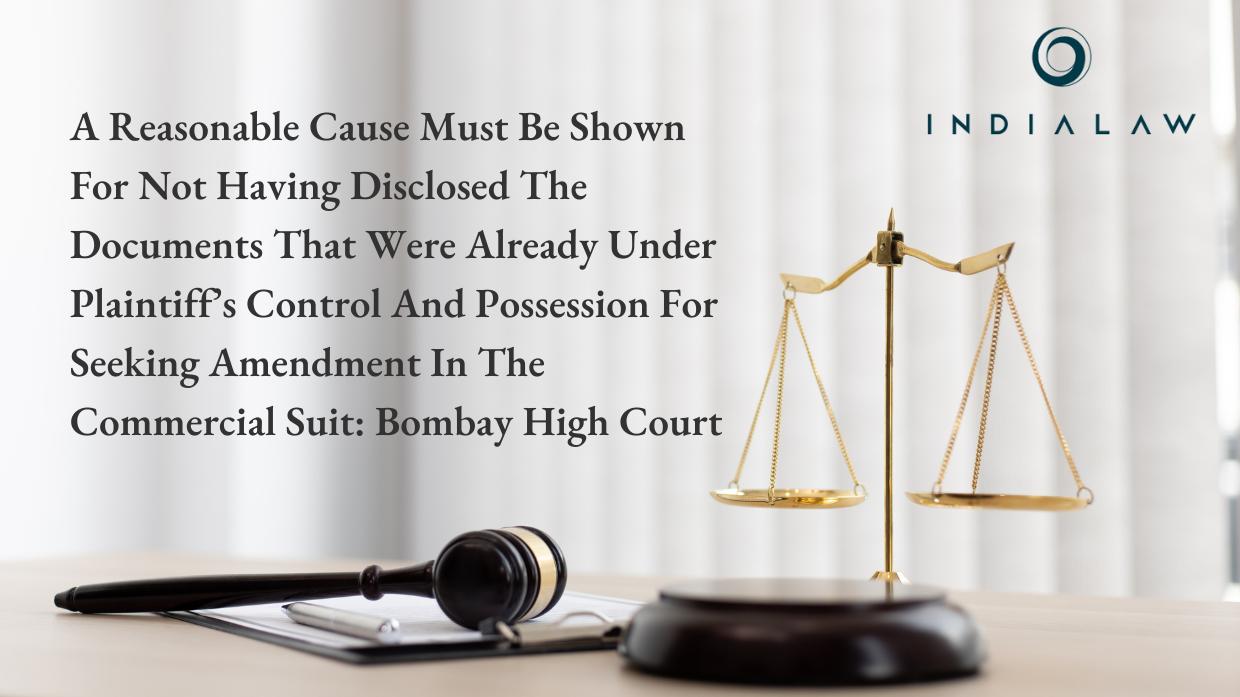A Reasonable Cause Must Be Shown For Not Having Disclosed The Documents That Were Already Under Plaintiff’s Control And Possession For Seeking Amendment In The Commercial Suit: Bombay High Court

The Hon’ble Bombay High Court in Khanna Rayon Industries Pvt. Ltd[1] held that the Court may grant an amendment to a commercial suit if it is deemed essential for resolving the core dispute between the parties. However, if the proposed amendment is coupled with a prayer for placing on record documents that were already in the power, possession, custody, or control of the plaintiff, but could not be placed on record due to inadvertence the Court must adhere to the strict provisions of Order 11 of the CPC, as amended and applied to commercial suits.
In the present case, the Plaintiff[2] sought various amendments, including the addition of two Exhibits containing supplementary documents. The Defendant[3] objected to the later amendment, contending that the stringent provisions of the Commercial Courts Act should be invoked, as the documents were already in the Plaintiff’s possession when the suit was initiated. Conversely, the Plaintiff argued that Order 6 Rule 17 of the CPC[4] permitted broad amendments to facilitate the efficient resolution of disputes. The Plaintiff further argued that the Commercial Courts Act had not modified Rule 17, and as such, the amendment should be allowed.
The Key issues before the Hon’ble Court were that when an application is filed to amend and to seek the addition of two Exhibits containing additional documents on record under Order 6 Rule 17 of the Civil Procedure Code, 1908 (“CPC“), whether the rigors of order 6 of CPC, as amended by the Commercial Courts Act,2015 would apply and to what extent.
Furthermore, the question arises as to whether the strict criteria outlined in the amended Order 11 of the CPC should be taken into consideration when the proposed amendment of the plaint in a commercial suit seeks to place on record documents that were admittedly in the power, custody, control or possession of the Plaintiff at the time of filing of the suit.
In light of the above issues, it was held that such amendment applications have to satisfy a twin test. The Hon’ble Court further held that there can be no dispute regarding the principle that if the proposed amendment is essential to ascertain the genuine dispute between the parties the Court should adopt a lenient approach when considering amendments sought during the pre-trial phase.
However, when the Plaintiff intends to introduce documents into the commercial suit governed by the stipulations of the Commercial Courts Act and, consequently, by the amendments introduced to the CPC by the said Act, such a proposed amendment must undergo scrutiny based on the criteria outlined in Order 11 of the CPC, as amended and applicable to proceedings under the Commercial Courts Act.
The Court further noted that the statement of objects and reasons of the Commercial Courts Act explicitly highlights the imperative for expeditious resolution of high-value commercial disputes. To fulfil this objective, various provisions of the CPC, including Order 11, have been modified and extended to encompass commercial suits. Therefore, the Commercial Courts Act, being a specialized statute, must operate with full stringency in the context of commercial suits.
Furthermore, it cannot be contended that the stringency introduced in procedural law, i.e., the CPC in accordance with the Commercial Courts Act, can be disregarded merely because Order 6 Rule 17 of the CPC remains unaltered concerning commercial suits. If such an approach is embraced, an application, fundamentally aligned with the principles of Order 6 of the CPC as applied to commercial suits, could falsely present itself as an application for amendment under Order 6 Rule 17 of the CPC.
In light of the above considerations, the Hon’ble Court held that it may allow an amendment to a commercial suit when such an amendment is deemed essential for resolving the core dispute between the parties. However, if the proposed amendment is intertwined with a prayer to introduce documents that were already within the plaintiff’s power, possession, custody, or control, but were not initially included in the suit, the Court is obliged to apply the strict provisions of Order 11 of the CPC, as amended and applied to commercial suits.
Subsequently, the Court noted that the plaintiff’s application failed to establish sufficient reasonable cause for not disclosing the documents alongside the original plaint, deeming the reasons provided, such as “oversight” and “inadvertence,” as inadequate.
[1] Khanna Rayon Industries Pvt. Ltd v. Swastik Associates & Ors. (BOM-HC-OOCJ) (IA/5251/2022 in COMS/316/2020)
[2] Khanna Rayon Industries Pvt. Ltd (Plaintiff)
[3] Swastik Associates & Ors (Defendants)
[4] [17. Amendment of pleadings.—The Court may at any stage of the proceedings allow either party to alter or amend his pleadings in such manner and on such terms as may be just, and all such amendments shall be made as may be necessary for the purpose of determining the real questions in controversy between the parties: Provided that no application for amendment shall be allowed after the trial has commenced, unless the Court comes to the conclusion that in spite of due diligence, the party could not have raised the matter before the commencement of trial.
By entering the email address you agree to our Privacy Policy.



